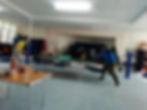Night shelter lock-in
- BRBC
- Mar 31, 2020
- 3 min read
by Malcolm Patten

It was Monday 23rd March 2020 and I had agreed for us to take on the evening's Night Shelter to cover for another church unable to do it. While we were cooking dinner people were checking their phones anticipating a lockdown due to the coronavirus and eventually it came: Boris Johnson announced the restriction on movement. This left us with a dilemma: Where were the 13 homeless people we had in the shelter going to go if they couldn't walk the streets or go to the library? I suggested they stay put in our church hall until lunch time on Tuesday while the overseeing charity worked out their response, but it was clear that the homeless guys had nowhere to go and were no longer free to walk the streets or sit around in the public spaces. We decided to reduce exposure by keeping volunteers to a minimum, with just the Caseworker, the Overnight worker, and myself maintaining what had now become 'Hostel Blackhorse Road'. We ran it as if it were a household, encouraging the guys to stay in except for short walks for exercise and to go to the shops. There was an expectation that proper hotel accommodation was just around the corner for them (provided by Mayor of London's office) but each day passed with no progress. Eventually, five days later, they moved into a hotel in Ilford to ride out the coronavirus crisis. Some years ago, I came across the story of Ernest Shackleton. He was an Antarctic explorer who, in 1915, was leading an expedition on a ship named Endurance, when it became stuck in the ice and they were trapped until the winter passed. They maintained a routine to keep their spirits up. And so with 13 homeless guys in our hall, we settled on a routine of resting or going for a walk (individually) in the morning and table tennis and snooker in the afternoon. On the third day they took it upon themselves to clear the space and mop out the hall and toilets. On the fourth day laundry became an issue and we ended up with chairs in a row drying out shirts and underwear and the like. We had to improvise an 'all over wash' room in the cleaning cupboard where there was a low sink and hot water, and the Prayer Room was kept for prayers after breakfast and then as a TV lounge for the rest of the day. One of the guys became my companion in the kitchen to prepare meals - we didn't go hungry! A local community organising network brought books, chocolates and toiletries and others delivered food. Finally, after thinking we were going to be abandoned for another week, Waltham Forest Council came good and arranged the transfer of the guys to a hotel in Ilford, five miles away. It was hard for them after being in such a homely community for five days, (and for five months in the shelter for some of them) to being in isolation, in their own room in a hotel. On the other hand their facilities were much improved and it was safer for them. We were always conscious that in the shelter, if one caught the virus, we would all catch the virus. I was pleased that we were able to utilise our building during this crisis to meet such a pressing need. I am constantly reminded of the words of Jesus when he said, 'I was hungry and you gave me something to eat, I was thirsty and you gave me something to drink, I was a stranger and you invited me in... I tell you, whatever you did for one of the least of these brothers and sisters of mine, you did for me.' (Matthew 25.35 & 40). I think we did that!
